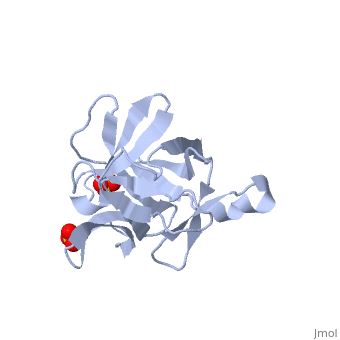2nvh: Difference between revisions
No edit summary |
No edit summary |
||
| Line 4: | Line 4: | ||
|PDB= 2nvh |SIZE=350|CAPTION= <scene name='initialview01'>2nvh</scene>, resolution 1.53Å | |PDB= 2nvh |SIZE=350|CAPTION= <scene name='initialview01'>2nvh</scene>, resolution 1.53Å | ||
|SITE= | |SITE= | ||
|LIGAND= <scene name='pdbligand=SO4:SULFATE ION'>SO4</scene> | |LIGAND= <scene name='pdbligand=SO4:SULFATE+ION'>SO4</scene> | ||
|ACTIVITY= | |ACTIVITY= | ||
|GENE= IL1B, IL1F2 ([http://www.ncbi.nlm.nih.gov/Taxonomy/Browser/wwwtax.cgi?mode=Info&srchmode=5&id=9606 Homo sapiens]) | |GENE= IL1B, IL1F2 ([http://www.ncbi.nlm.nih.gov/Taxonomy/Browser/wwwtax.cgi?mode=Info&srchmode=5&id=9606 Homo sapiens]) | ||
|DOMAIN= | |||
|RELATEDENTRY= | |||
|RESOURCES=<span class='plainlinks'>[http://oca.weizmann.ac.il/oca-docs/fgij/fg.htm?mol=2nvh FirstGlance], [http://oca.weizmann.ac.il/oca-bin/ocaids?id=2nvh OCA], [http://www.ebi.ac.uk/pdbsum/2nvh PDBsum], [http://www.rcsb.org/pdb/explore.do?structureId=2nvh RCSB]</span> | |||
}} | }} | ||
| Line 14: | Line 17: | ||
==Overview== | ==Overview== | ||
The extent to which water is present within apolar cavities in proteins remains unclear. In the case of interleukin-1beta (IL-1beta), four independent structures solved by x-ray crystallography indicate that water is not present in the central apolar cavity. In contrast, results from NMR spectroscopy suggest that water has high occupancy within the cavity but is positionally disordered, making it undetectable by standard crystallographic methods. A theoretically based crystallographic-phase refinement technique also suggested that there was the equivalent of two fully occupied water molecules within the apolar cavity. To resolve these discrepancies we sought to obtain an experimentally phased electron density map that was free of possible bias caused by mathematical modeling of the protein or the solvent. By combining native diffraction data with multiple wavelength anomalous data from a platinum derivative, accurate phases were obtained. Using these experimental phases, we estimate that occupancy of the apolar cavity in IL-1beta by solvent is close or equal to zero. Polar cavities in the protein that contain ordered solvent molecules serve as internal controls. | The extent to which water is present within apolar cavities in proteins remains unclear. In the case of interleukin-1beta (IL-1beta), four independent structures solved by x-ray crystallography indicate that water is not present in the central apolar cavity. In contrast, results from NMR spectroscopy suggest that water has high occupancy within the cavity but is positionally disordered, making it undetectable by standard crystallographic methods. A theoretically based crystallographic-phase refinement technique also suggested that there was the equivalent of two fully occupied water molecules within the apolar cavity. To resolve these discrepancies we sought to obtain an experimentally phased electron density map that was free of possible bias caused by mathematical modeling of the protein or the solvent. By combining native diffraction data with multiple wavelength anomalous data from a platinum derivative, accurate phases were obtained. Using these experimental phases, we estimate that occupancy of the apolar cavity in IL-1beta by solvent is close or equal to zero. Polar cavities in the protein that contain ordered solvent molecules serve as internal controls. | ||
==About this Structure== | ==About this Structure== | ||
| Line 27: | Line 27: | ||
[[Category: Matthews, B W.]] | [[Category: Matthews, B W.]] | ||
[[Category: Quillin, M L.]] | [[Category: Quillin, M L.]] | ||
[[Category: | [[Category: hydration]] | ||
[[Category: | [[Category: protein folding]] | ||
[[Category: water]] | |||
''Page seeded by [http://oca.weizmann.ac.il/oca OCA ] on | ''Page seeded by [http://oca.weizmann.ac.il/oca OCA ] on Mon Mar 31 04:09:02 2008'' | ||
Revision as of 04:09, 31 March 2008
| |||||||
| , resolution 1.53Å | |||||||
|---|---|---|---|---|---|---|---|
| Ligands: | |||||||
| Gene: | IL1B, IL1F2 (Homo sapiens) | ||||||
| Resources: | FirstGlance, OCA, PDBsum, RCSB | ||||||
| Coordinates: | save as pdb, mmCIF, xml | ||||||
Determination of Solvent Content in Cavities in Interleukin-1 Using Experimentally-Phased Electron Density
OverviewOverview
The extent to which water is present within apolar cavities in proteins remains unclear. In the case of interleukin-1beta (IL-1beta), four independent structures solved by x-ray crystallography indicate that water is not present in the central apolar cavity. In contrast, results from NMR spectroscopy suggest that water has high occupancy within the cavity but is positionally disordered, making it undetectable by standard crystallographic methods. A theoretically based crystallographic-phase refinement technique also suggested that there was the equivalent of two fully occupied water molecules within the apolar cavity. To resolve these discrepancies we sought to obtain an experimentally phased electron density map that was free of possible bias caused by mathematical modeling of the protein or the solvent. By combining native diffraction data with multiple wavelength anomalous data from a platinum derivative, accurate phases were obtained. Using these experimental phases, we estimate that occupancy of the apolar cavity in IL-1beta by solvent is close or equal to zero. Polar cavities in the protein that contain ordered solvent molecules serve as internal controls.
About this StructureAbout this Structure
2NVH is a Single protein structure of sequence from Homo sapiens. Full crystallographic information is available from OCA.
ReferenceReference
Determination of solvent content in cavities in IL-1beta using experimentally phased electron density., Quillin ML, Wingfield PT, Matthews BW, Proc Natl Acad Sci U S A. 2006 Dec 26;103(52):19749-53. Epub 2006 Dec 18. PMID:17179045
Page seeded by OCA on Mon Mar 31 04:09:02 2008
